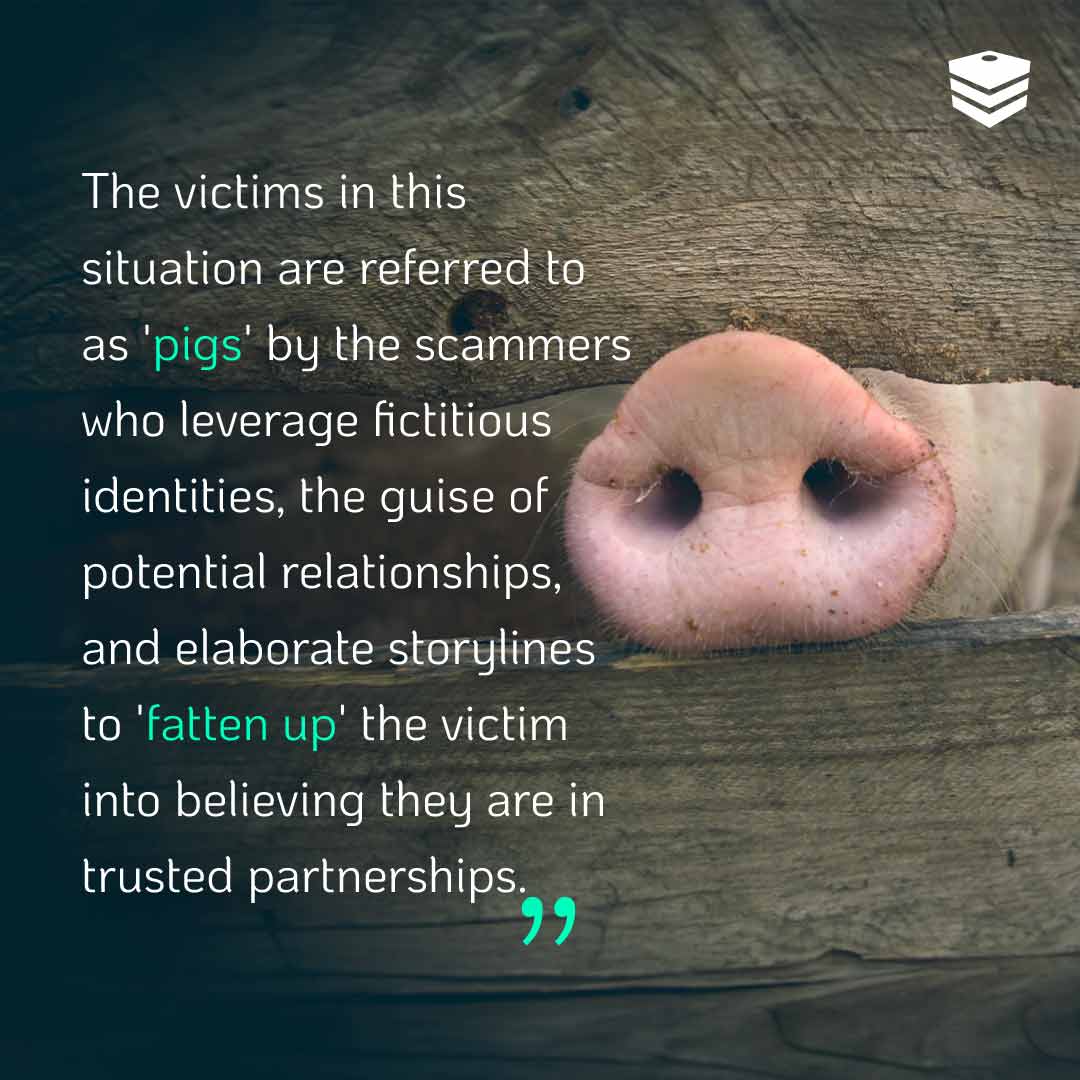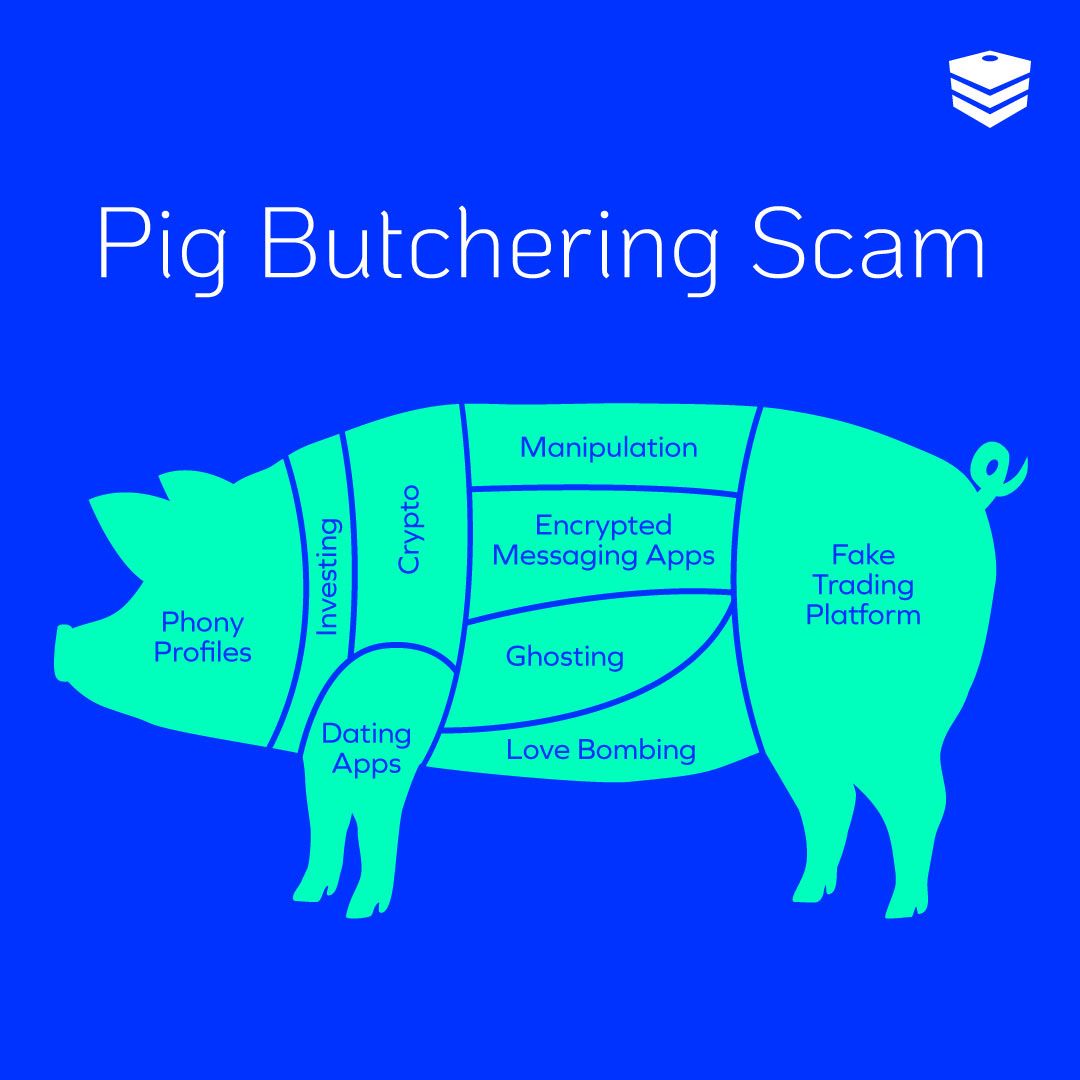Cybersecurity Consulting
What Is a Pig Butchering Text Scam and How Can You Avoid It?
September 19, 2023
9 minute read

Understanding the different types of text and social engineering scams that exist helps everyday people, high level employees, and business leaders avoid falling victim. One of the more sophisticated attacks that’s become popular recently is known as a pig butchering text scam.
The pig butchering text scam, or shāzhūpán as it was originally known in China, leaves victims financially and emotionally crippled while generating billions of dollars for criminal syndicates on an annual basis. To make matters worse, the pig butchering text scam industry is largely built on forced labor.
Sign up for our newsletter!
Pig butchering scams use social engineering to lure vulnerable people into phony financial investments, typically in the way of cryptocurrency, before disappearing with as much of their money as possible. By understanding how pig butchering scams work and practicing caution, you can identify and avoid these text scams with some amount of ease.
Business is becoming more global every year, which means more employees are traveling for work. To keep your staff and organization protected, review DOT Security’s Cybersecurity Checklist for When You’re on the Go.
How Do Pig Butchering Scams Work?
Pig butchering scams got their name because the scammers are aiming to get as much money out of their victim as possible. The idea is that the victim here is being ”fattened up” before the slaughter. This is the first arm of the scam, rooted in social engineering.

A lot of pig butchering scams start out with a seemingly harmless message from an unknown number. The message will read something like, “Hey, it was so good catching up with you at the reunion!” or even just a simple, “Hello” followed up by a second message trying to establish contact.
This acts as the bait in a lot of pig butchering text scams as many victims recount a simple courtesy reply saying, “wrong number” as the catalyst for financial devastation.
Another way that scammers will make contact is through dating apps or social media platforms as they look for vulnerable, high-value individuals to target. Once contact is established, the scammer will work to develop a sense of trust and companionship. Over time, however, they’ll start to introduce the concept of cryptocurrency, or other financial opportunities, into the conversation.
After enough manipulation and persuasion, the scammer posing as an emotional or romantic confidant will get the pig butchering victim to create an account on a malicious platform that appears to be legitimate. These fake trading platforms are well-crafted and designed to look and feel real, mimicking those of authentic trading platforms.
Once Investing Gets Involved
At this point, once the victim has made their first deposit into the malicious investing platform, the scammer has them right where they want them. To avoid suspicion, however, the scammer will post modest gains to the victims account and may even allow them to make some small first-time withdrawals.
This is all a part of the scheme that’s meant to build trust and appear legitimate. From here, the scammer will push their victim into larger and larger investments, and might even try to convince them to take out loans or borrow money from their friends and family.

When the victim tries to cash out, instead of being allowed to withdraw the funds in their account, they’re met with a series of financial penalties in the way of taxes and other fines that have to be paid to unlock the funds.
However, these are, of course, all fake tactics leveraged by the scammers to get additional payments from victims. When it’s all said and done, the scammer disappears from the victim's life, as does the malicious trading application, and all of the money that was deposited or paid.
The Financial and Emotional Toll
Not only are victims of pig butchering text scams left with mountains of debt, but they’re also emotionally scarred after the experience. While these tactics might seem thinly veiled in some cases, most victims are already in an emotionally vulnerable place when the scammer enters their life, making them susceptible to the deception.
Then, when their new friend, romantic interest, or companion completely disappears without a trace, they’re left with nothing but questions.
In one infamous case, the pig butchering victim Cindy Tsai was being preyed on while undergoing chemotherapy.
Identifying and Avoiding Pig Butchering Text Scams
As more of these stories come to light, there are telltale signs of pig butchering scams that can help you identify them. These indicators include the following:
- An unexpected text from an unknown number saying hello, or pretending to be an old friend.
- Conversations that move to cryptocurrency or investing opportunities much too quickly.
- Excuses not to talk over the phone, meet in person, or even video call.
- Promises of big financial gains.
The best way to avoid being sucked into a pig butchering text scam is to do your own independent research when it comes to investing and to only invest through legitimate platforms and websites. Don’t download or make accounts through links sent to you by unknown numbers or people you’ve only interacted with virtually.
This is crucial when it comes to avoiding pig butchering text scams because the entire scheme relies on the victim investing in the phony financial accounts. If you stick to investing and trading through authentic platforms, you shouldn’t have to be worried about falling victim to a pig butchering scam.
In fact, unless you just exchanged contact information with someone, or you’re expecting a call from the Uber Eats delivery driver, it’s best to ignore calls and texts from unknown numbers in general.
On the Other Side of the Screen
Unfortunately, the victims of pig butchering text scams aren’t the only people being harmed by this industry. Because these scams are considered to be labor-intensive, there are large scam centers that are largely dependent on victims of human trafficking to generate profits and actually execute the scams.
This makes awareness around pig butchering scams all that more important because, by raising awareness, fewer of these scams will be successful, hopefully lowering the demand for scam labor.
All-in-all, the rise of pig butchering text scams, and the large-scale scam centers operating in the golden triangle special economic zone, have created what’s been labeled as a humanitarian crisis by non-governmental organizations (NGO) across the world.
Organizations like the Global Anti Scam Organization (GASO) are working to address the issues nurturing this malicious and cruel industry.
Final Thoughts on Avoiding Pig Butchering Scams
Pig butchering text scams have cost victims unfathomable amounts of money, leaving them financially crippled, emotionally torn apart, and with very little hope of recovering their funds.
This makes it crucial to identify pig butchering text scams from the get-go, so you can avoid falling victim yourself. Avoiding investment advice from unknown parties, no matter how many times you’ve texted with them, is the best way to keep from falling prey to a pig butchering text scam.
In fact, it’s a digital safety best practice to ignore calls and texts from unknown numbers in general.
As the workforce becomes more internationally connected, employees often need to travel. Keep your staff and your organization protected with DOT Security’s Cybersecurity Checklist for When You’re on the Go.
